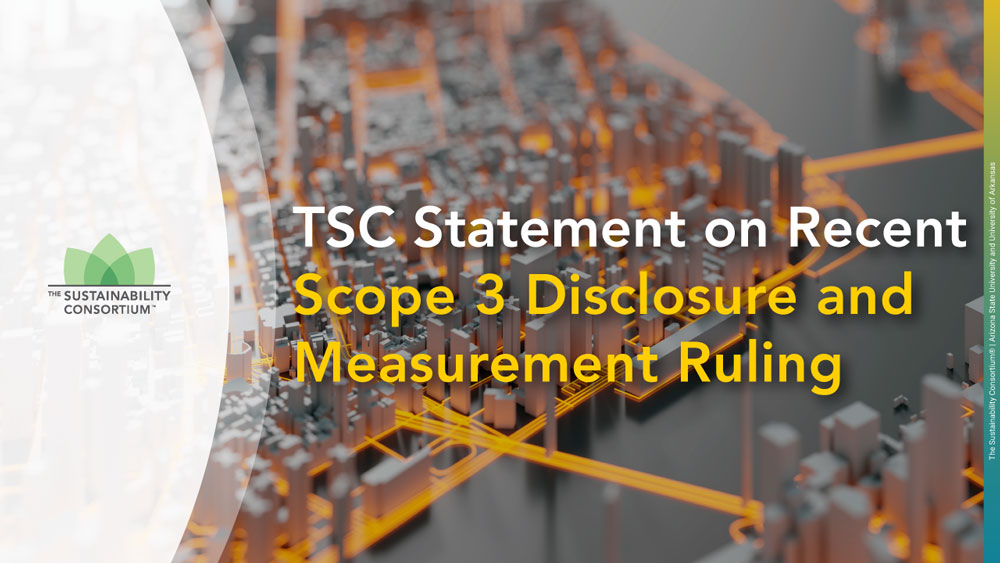While The Sustainability Consortium (TSC) applauds the recent news that the U.S. Security and Exchange Commission (SEC) climate disclosure guidance requires many publicly traded companies to start disclosing their Scope 1 and 2 GHG emissions by 2026 we regret that the SEC guidance does not require companies to disclose their Scope 3 (supply chain) GHG emissions. Scope 3 emissions are important to address as for a typical company, their Scope 3 emissions are 90% or more of their total emissions.
This does not mean that companies can ignore Scope 3 emissions for now – far from it. Many companies will need to comply with Scope 3 requirements from recent California (CA SB 253) and EU (CSRD) policy. Every large company required to disclose their Scope 3 is going to be expecting all their suppliers, including smaller suppliers, to provide their own emissions disclosure. Additionally, retailers, industrial buyers, and consumers continue to create market demand for materials and products with low carbon footprints, and Scope 3 disclosure is key to support those decisions.
Many businesses pursue Scope 3 emissions tracking for various reasons, including managing reputational risks, meeting investor and customer expectations, and complying with regulations. Aside from these reasons, many companies voluntarily track Scope 3 emissions simply because it is the best way to understand and reduce their environmental impact.
Members of TSC agree with this sentiment. Daryl Sabourin, Senior Director of the ASR Group Int., says “ASR Group recognizes the need to understand the embodied carbon present within our value chain, as an ingredient within other products or as a component of a user’s personal environmental impact. Recognizing this need for transparency, ASR Group will maintain its efforts to study, disclose, and continuously improve our carbon footprint models across all scopes of influence, in accordance with international standards like the GHG Protocol.”
Now is the time to set goals and measure your own progress on reducing Scope 1 and 2 emissions, as soon enough your downstream customers or retailers will need to know them. Companies can then use economic and LCA models to get a “good enough” grasp of their Scope 3 emissions and begin to collect primary Scope 3 data by asking their direct, tier 1 suppliers to measure and disclose their Scope 1 and 2 GHG emissions. See this TSC Scope 3 Guidance report for more recommendations.
TSC’s THESIS enables consumer product manufacturers to disclose their Scope 1 and 2, and some Scope 3 emissions to multiple retailers on a single, common platform. Data from over 2500 responses from 2023 THESIS, 43% of consumer product manufacturers measured and disclosed their Scope 1 GHG emissions, 41% disclosed their Scope 2 emissions, and 18% disclosed their Scope 3 emissions. Fifteen percent of companies had adopted certified science-based targets.
Collecting primary emissions data from activities that are farther upstream, such as on-farm GHG emissions, is challenging. SupplyShift/Sphera offer tools to aggregate data across supply chain tiers and make Scope 3 estimates. Additionally, organizations like our partners Cool Farm Tool, Stewardship Index for Specialty Crops, or Field to Market create calculators that enable growers to input their operating data and get estimates of environmental outcomes, including GHG emissions. Finally, sharing emissions data in a supply chain requires relations and trust as much as technical solutions. TSC’s research with Trust in Food has highlighted what incentives are needed to gain grower trust, and the key role that the financial sector can act as a bridge and motivator for engagement.
While broad Scope 3 disclosure requirements in the US are on temporary hold there is an urgency to move forward. 2023 was the warmest year on record with the global average near-surface temperature at 1.45 °C above the pre-industrial baseline. We are near or at the tipping point that climate scientists have warned us of for over a decade. Scope 3 is simply not an option if we want to minimize the irreversible impacts of GHG emissions and climate change.

